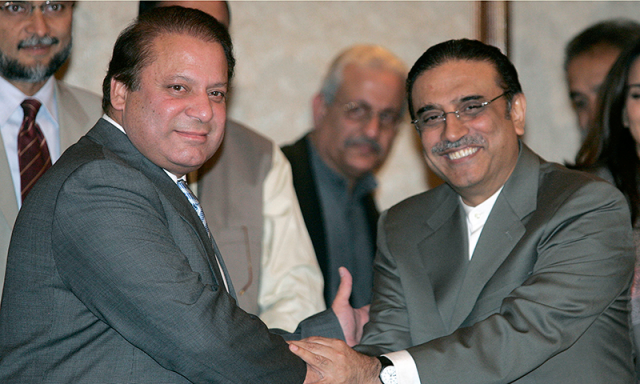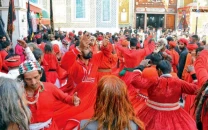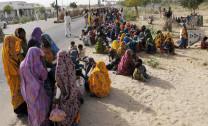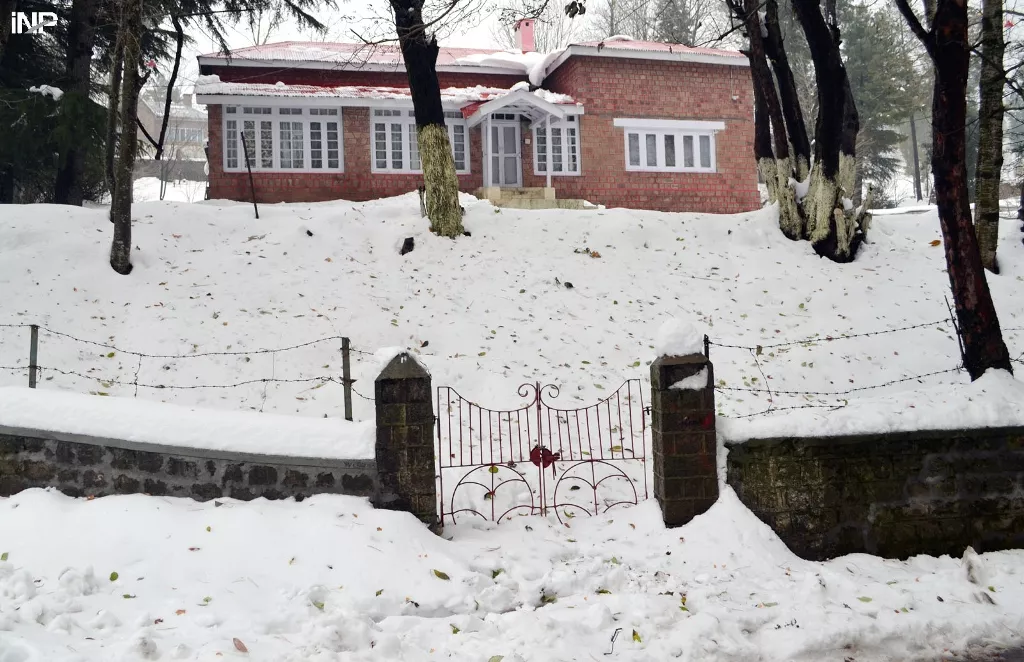'Corruption remains a systemic problem in Pakistan'
It is important to distinguish between public perception and actual corruption as perceptions are often misleading.

Prime Minister Nawaz Sharif and former president Asif Ali Zardari. PHOTO: AFP
Unfortunately, any debate that merely targets political parties or mega scandals turns frivolous rather quickly and ends up ignoring the structural problems that lead to corruption in the country. If we want to adequately tackle corruption, it is imperative that we acknowledge that corruption is a systemic problem in Pakistan.
It is also important to distinguish between the public perception of corruption and the level of actual corruption that exists in the country. Too much reliance on indexes that reflect public perception can be misleading as it just gives a false figure to the government to boast about reductions in corruption without having done anything concrete to address the structural problems that lead to the illegal practice. For instance, in 2016, a report by Transparency International (TI) noted Pakistan improving its rank from 30 to 32 on a scale of 0 (highly corrupt) to 100 (very clean) in Corruption Perceptions Index (CPI).
Pakistan improves in corruption ranking
This index was used by many in PML-N to argue that corruption has been declining during their tenure, however, a deeper introspection reveals that public perception is not always driven by facts. Rather, it is influenced by the media and subjective experiences. So one reason that people perceive PML-N to be less corrupt is because the party focuses on visible governance – building infrastructure in big cities – where it’s able to affect the perception of urban dwellers. And although PML-N does succeed in keeping most of these infrastructure projects immune from corruption through direct oversight and supervision, it does not mean that it has taken any action to curb corruption that remains systemically-entrenched within the system and outside its direct supervision.
Now just consider some facts which reveal the magnitude of corruption in the country. First, according to the same TI report, 60 per cent of Pakistanis admitted to having paid bribes to get access to basic services such as health and education. And even with a slight improvement in CPI score, Pakistan still stands at 116 out of 176 countries and is ranked ‘high’ in terms of the level of corruption. On the other hand, India and China both stand at 79 according to the same index. As for the systemic corruption in Pakistan, which remains largely ignored, the National Accountability Bureau itself admitted in 2016 that Pakistan loses around $133 million daily to systemic corruption.
Importance of institutions
Reviewing literature on good governance from books such as Why Nations Fail by Daron Acemoğlu, What is governance? by Francis Fukuyama, and Candles in the Dark by Pakistani authors Mahmood Ali Ayub and Syed Turab Hussain, reveals a constant theme of the importance of good institutions in eliminating corruption. Therefore, if we are to address the structural problems that lead to corruption, there is one thing which can play a significant role in this aspect - it is improving the quality of government institutions in Pakistan.
Institutional capacity is not only vital for eliminating corruption but, also to achieve stability on a macro level. It is no surprise that Pakistan’s institutions rank 129 out of 144 countries according to World Economic Forum’s Executive Opinion Survey in 2015 - which is second lowest in the region, just above Bangladesh.
Bribery
The first reason for this low ranking is bribery, which hampers the institution from making prompt and impersonal decisions it is supposed to make. Anyone who has been to a government institution would not be surprised to find that Pakistan ranks 123 out of 144 countries in bribery and irregular payments, which is one of the lowest in the region.
NBP’s female official arrested for ‘Rs1.5 billion fraud’
Furthermore, an astounding 75% Pakistanis admitted to paying bribes to the police to get their work done. The very fact that there is no remorse or dishonour in the transaction of bribery points towards the inherent hypocrisy of our society. Unfortunately, the consciousness of the society has not elevated to a level where bribery becomes socially unacceptable, nor has the government taken any innovative initiatives to deal with the menace of bribery. What’s needed is social awareness coupled with citizens-backed accountability mechanism.
Favouritism and kinship
Another factor which plays a vital role in corruption is favouritism and the tightly-knit kinship system in the country. Favouritism in government institutions is almost a cultural phenomenon in Pakistan. No wonder the country ranks 101 out of 144 countries for favouritism in government officials’ decision-making – again one of the lowest in the region. It must be understood that corruption is not always financial embezzlement by top government officials or politicians benefitting in isolation. Rather, it is entrenched within the social structure of the society. When a person gets in a position of power or authority, they feel a sense of responsibility to cater primarily to their family or biradari and so on. This, in turn, breeds favouritism and corruption in kinship system where politicians are focused on handing over lucrative contracts to their family members and bureaucrats often favour their kin when making decisions.
Fighting corruption: NAB recovered Rs45b in two and a half years
Political interference
The third factor is political interference in government institutions. While politicians do have to maintain a working relation with the government institutions and bureaucracy, it turns problematic when they want to use these key institutions to further their political goals. It is a well-known fact for anyone who observes the workings of most institutions such as the police or land revenue department.
Let’s just take Pakistan International Airlines (PIA) as a test case. One reason PIA became such a corrupt enterprise is because it has a history of political interference. This political interference led to the hiring and firing of employees at the personal whims of politicians who wanted to reward loyalists. Just consider that PIA employs 630 employees per plane compared to only 245 employees per plane employed by Emirates. Good institutions have transparent guidelines which define their workings and prevent political interference by strict adherence to those guidelines. Unfortunately, Pakistan ranks at 118 out of 144 in the transparency of government policy making, which is the lowest in the region. Therefore, it’s certainly no enigma then why institutions such as PIA have constantly been a burden on the public exchequer.
Political will must to wipe out corruption: NAB chief
In hindsight, it is essential to remember that corruption will not go away simply with a change of government. It’s important that the government comes up with a comprehensive policy which is long term and addresses the structural problems which lead to corruption. This will require making the workings of government institutions and policymaking more transparent. Furthermore, an efficient and responsive system of accountability needs to be introduced which ensures that citizens are aware and part of the accountability process as watchdogs.
Saad Ahmed Dogar is a lawyer based in Lahore.



















COMMENTS
Comments are moderated and generally will be posted if they are on-topic and not abusive.
For more information, please see our Comments FAQ